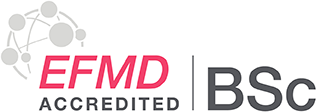Practical – Knowledge put to practice
Teaching and research at the Business School are practice-oriented: Students benefit from guest lectures, excursions, and exchanges with representatives from business, politics, and society. All Bachelor students sharpen their profile in a mandatory internship. A consistent practical focus and a sound theoretical foundation gives the students of the Business School a solid foundation for a successful start in their careers.
The Business School's identity states: "Our teaching conveys the current state of knowledge and is application-oriented. Our alumni move confidently in a dynamic, increasingly interdisciplinary and global working world, knowing how to deal with the responsibilities involved."
The faculty has been pursuing this mission ever since it was founded as a Business College in the summer semester of 1963. Based on the findings of economic research and the use of practical business experience, the bachelor’s and master’s programs not only provide the students with state-of-the-art knowledge, but also focus on imparting personal skills as well as a sense of social responsibility.
The Pforzheim Model
The business administration Bachelor's programs and the business law program are based on the Pforzheim Model. This means that approximately 70% of the courses are identical for all students, especially in the areas of general business administration, economics, law and quantitative methods. The remaining 30% of the courses are reserved for teaching the content of the respective major.
This 70:30 model is the basis for the labor market success of all Pforzheim graduates. The broad basic business education enables diverse careers even beyond the specialization of each study program.
Real-life project work, guests in classroom & excursion week
Relevant practical experience of all professors is the basic prerequisite for the practical-oriented teaching at Business School Pforzheim. All professors have at least five years of practical professional experience and incorporate their knowledge into the development of curricula and the design of courses.
Application examples, case studies and guest lectures by experts from business and industry ensure that theory and practice are constantly linked in the courses. In the student’s major fields of study, practical projects offer a practical perspective as a supplement to the theoretical knowledge imparted in lectures. Students develop solutions for "real problems" of real clients and apply the knowledge they have acquired during their studies.
In addition, at the end of their studies, each student takes part in a management simulation, colloquially known as a business simulation. This course sustainably supports knowledge transfer and enables the student’s knowledge to be experienced.
A special highlight for the third and fourth semesters of all bachelor's programs as well as numerous master's programs is the excursion week in the summer semester. During city trips to e.g. Hamburg, Berlin, London or Paris the students gain insights into companies and their current challenges and market trends. Moreover, the excursion contributes to orientation in the professional field and networking.
SIK program and student initiatives
The Business School also encourages social, methodological and intercultural skills - the so-called key qualifications or soft skills. In the bachelor's degree programs in business administration and business law, these key qualifications are taught from the first semester onwards through training seminars in the SIK-program. The skills taught include social skills (communication and teamwork skills), methodological skills (especially presentation skills) and personal skills (including persuasiveness and credibility). Since internationalization plays an important role at the Business School Pforzheim, the promotion of intercultural competences is also included.
Personal skills can also be fostered by participating in one of the numerous student initiatives, which aim to enrich everyday university life and provide practical experience in various fields of study. The list of student initiatives at Pforzheim University is long and covers a variety of interests, from start-up founding to event management or advertising, to the stock exchange.
Internship semester and Career Center services
In all bachelor's programs at the Business School, the fifth semester is intended as an internship semester, which can be completed in Germany or abroad. The goals of the internship semester are to get to know everyday working life, to apply the knowledge acquired so far, to train social skills and to examine one's own abilities, strengths, and weaknesses. With a duration of around six months, the internship semester guarantees a direct insight into professional practice.
In order to be optimally prepared for the internship application and other application situations, students can take advantage of the Business School’s Career Service. The Career Service offers a wide range of advisory services. Students can for example obtain support in preparing their application documents like their CV and motivation letter as well as participate in group trainings focusing on job interview situations.
Master's students at Business School Pforzheim are given the opportunity to network with company representatives through the "Meet Master" career platform. The event takes place regularly in the spring and allows students and companies to get to know each other in pre-arranged individual interviews or joint round-table discussions with company representatives.
Applied research: science-practice transfer
Application-oriented education requires teaching that is at the cutting edge of science. Therefore, applied research is also part of the profile of Pforzheim University. Through cooperation with companies, the research institutes and competence centers of Pforzheim University and the Business School make an important contribution to regional, supraregional and, in some cases, international promotion of innovation. The results of research flow directly into teaching at the bachelor's and master's level.
Research also takes place within the framework of teaching projects. As part of the bachelor's and master's programs, students learn quantitative methods, statistics and how to use programs such as SPSS. In teaching research projects, student research projects and theses, they conduct expert interviews or implement quantitative surveys, collect data and analyze it. Often, recommendations for action are derived from the results of those studies, but some are even published in scientific publications – which is the visible expression of the close integration of theory and practice.


